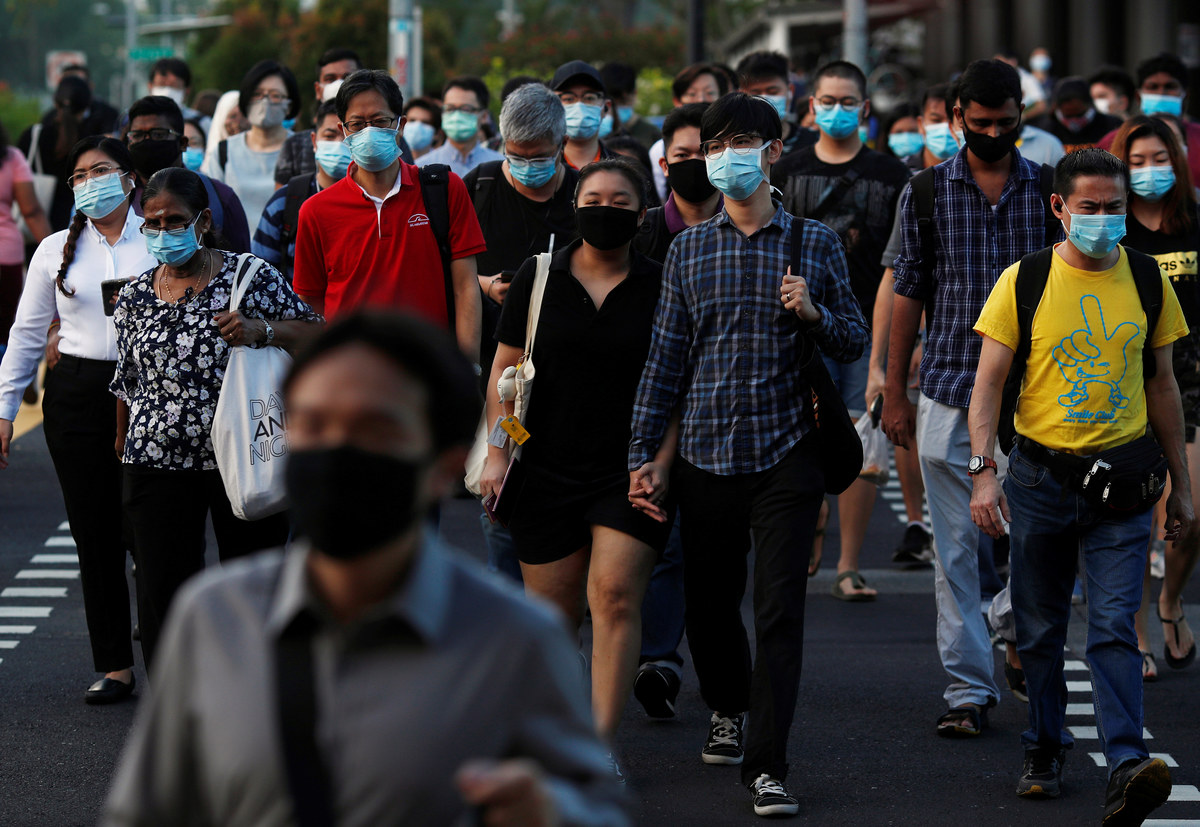DUBAI: Middle East countries are realigning priorities to adjust to post-coronavirus realities, particularly anticipating a drawn-out recovery period for their economies hit hard by the pandemic.
In Kuwait, Prime Minister Sheikh Sabah Khaled Al-Hamad Al-Sabah has called for understanding amid ‘critical circumstances’ that prompted a cut in government spending to address the pandemic’s economic impact.
Al-Sabah and the Kuwaiti cabinet earlier discussed stimulus measures “to overcome this phase with the least damage possible.”
Friday, June 5, 2020 (All times GMT)
16:10 - A World Health Organization scientist said on Friday that, in many areas of urban India, it was impossible to maintain social distancing. They added it was "very appropriate" for people to wear face coverings.
15:15 - The United Kingdom's death toll from confirmed cases of COVID-19 has exceeded 40,000, according to government data published on Friday.
In all, 40,261 people had died following positive tests for coronavirus as of 1600 GMT on Thursday, the health ministry said, up 357 from the previous day.
15:00 - Mosques in Jordan opened for communal prayers for the first time in over two months on Friday, with thousands of police deployed to enforce strict social distancing rules at the usually packed places of worship.

14:40 - Iraq recorded more than 1,000 new coronavirus cases in a single day for the first time on Friday, with its total approaching 10,000 confirmed cases, the health ministry said.
At least 285 people have died of COVID-19 in Iraq, it said.
It recorded 1,006 new cases on Friday, out of a total of 9,846 overall. The cases have tripled in the space of around three weeks.
13:45 - British scientists halted a large trial on Monday that had been exploring the use of the anti-malaria drug hydroxychloroquine in patients with the pandemic disease COVID-19 after initial results showed no evidence of benefit.
"We reviewed the data and concluded there is no evidence of a beneficial effect of hydroxychloroquine in patients hospitalised with COVID, and decided to stop enrolling patients to the hydroxychloroquine arm with immediate effect," said Martin Landray, an Oxford University professor who is co-leading the so-called RECOVERY trial.
"This is not a treatment (for COVID-19)," he added.
12:45 - Russia's cenbank governor says he doesn't expect to see a quick economic recovery in Russia following the COVID-19 outbreak.
12:30 - The number of daily new coronavirus cases in Iran has fallen back to under 3,000, the health ministry said Friday, a day after hitting a new peak.
Authorities registered 2,886 new cases of infection, health ministry spokesman Kianoush Jahanpour said, bringing the total number to 167,156 since the start of the outbreak in February.
11:17 – Up-to-date economic data suggests Ireland is now past the low point of the economic crisis forced by the coronavirus lockdown of its economy, and a gradual recovery is setting in, Finance Minister Paschal Donohoe said
09:05 – Algeria will resume some economic activities and allow a number of businesses to reopen from Sunday as part of a plan to end the coronavirus lockdown, the prime minister's office said.
08:53 – The Philippines’ health ministry confirmed three new coronavirus deaths and 244 more infections, the lowest single-day increase in cases in two weeks.
08:37 – A US aircraft carrier ship whose captain was removed for scathing remarks about a coronavirus outbreak onboard has returned to service in the Pacific Ocean, authorities said.
07:41 – Russia reported 8,726 new cases of the coronavirus, pushing the total number of infections to 449,834.
07:18 – Singapore’s health ministry confirmed another 261 coronavirus cases, the city-state’s smallest increase in nearly two months, taking its tally to 37,183. The lower number of cases was partly due to the fact that fewer swab-tests were conducted, the health ministry said.

People cross a street during morning peak hour commute amid the coronavirus disease outbreak in Singapore on June 3, 2020. (Reuters)
07:17 – The COVID-19 pandemic is now “under control” in France, the head of the government’s scientific advisory council said, as the country cautiously lifts the lockdown imposed in March to contain the outbreak.
06:18 - Australian police moved to ban a Black Lives Matter protest planned in Sydney, citing the risk of spreading the coronavirus.
06:09 - On paper, Haiti so far has everything it needs to battle the coronavirus crisis — unoccupied hospital beds, medical staff and supplies.
05:47 – More than 6.63 million people have been reported infected with the new coronavirus globally and 390,080 have died, a Reuters tally showed. Infections have been reported in more than 210 countries and territories since the first cases were identified in China last December.
05:47 – Bolivia ordered the closure of its embassies in Nicaragua and Iran while also shuttering three federal ministries in a cost-cutting move to free up money to fight the coronavirus, President Jeanine Anez said Thursday.
05:37 – Lebanon has extended its ‘general mobilization against coronavirus’ for another four weeks.
04:48 – Four more repatriation flights arrived in Saudi Arabia as part of the Kingdom’s efforts to bring back stranded citizens from coronavirus hotspots, state news agency SPA reported.
04:07 – The UAE has recorded 659 new coronavirus cases overnight after conducting additional 54,000 tests, raising the country’s caseload to 37,018, health ministry officials said. There were also three fatalities overnight, putting the UAE death toll to 273, state news agency WAM reported.


























